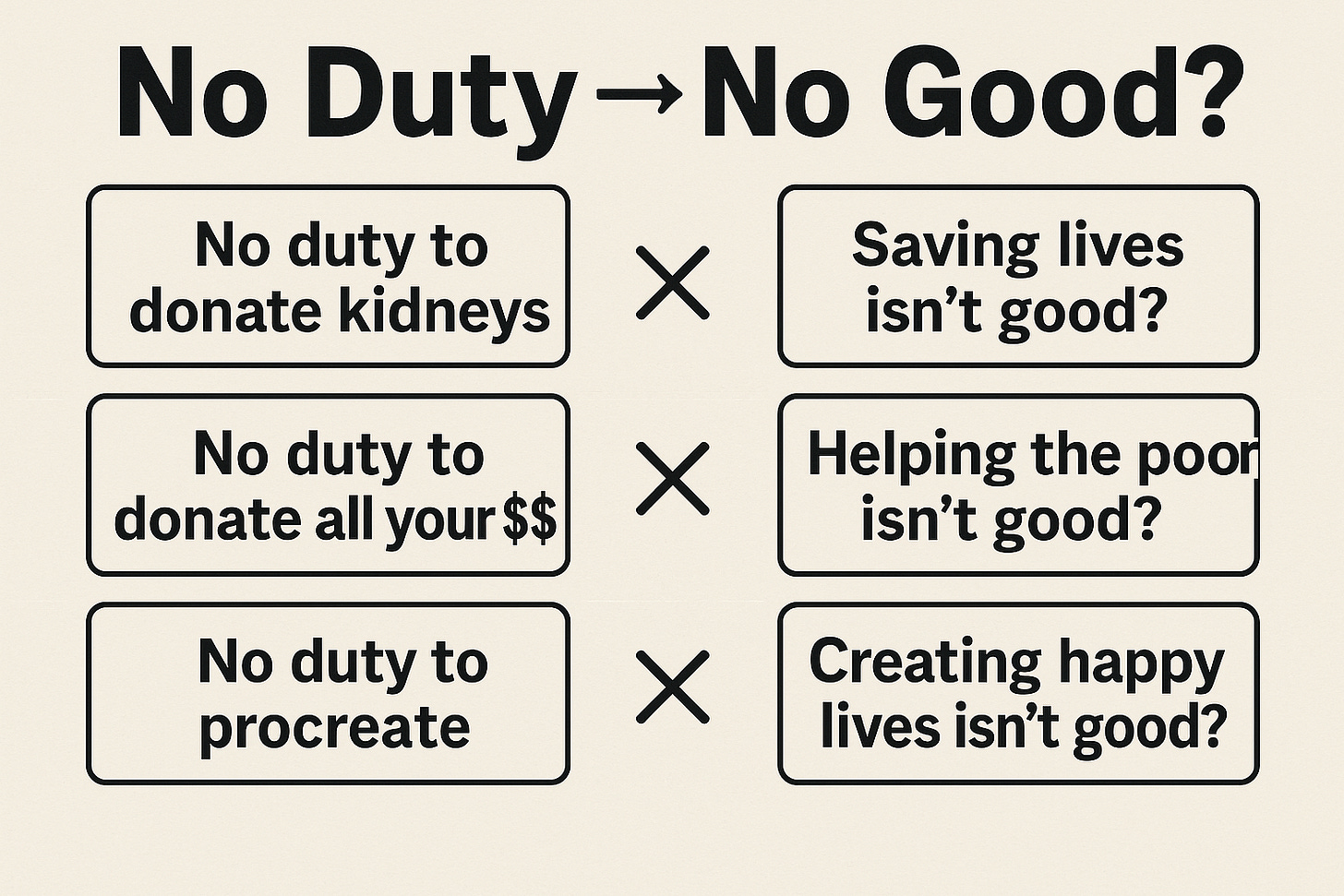The “No Duty → No Good” fallacy
(What) are people thinking?
I’m so frustrated by low-decoupling academics who refuse to acknowledge basic evaluative facts (like that, all else equal, it’s better to have smarter, healthier children) because they’re terrified of what they—mistakenly!—imagine to be the implications. If they’d just stop and think clearly for a minute, it shouldn’t be that hard to appreciate why the feared implications don’t really follow. (Hint: we should reject naive instrumentalism.)
I’m especially shocked by how many fall for (what we might call) the “No Duty → No Good” fallacy. As far as I can tell, the error is limited to reproductive ethics: I’ve never heard people reason so badly about other topics. But whatever the explanation, it’s incredibly common for (even otherwise intelligent) people to affirm the following bad argument: “It can’t be good to create happy lives, because that would generate implausible procreative duties: we would all be obligated to have as many kids as possible.”1 Since there’s no such duty, they reason, there can’t be anything good about the act in question.
Imagine reasoning like this about other topics. “It can’t be good to save the lives of dialysis patients, because that would generate implausible duties of kidney donation.” Or “children dying of malaria must not matter, lest they generate implausible duties of beneficence to donate all our money to effective charities.”
It’s especially odd for non-consequentialists, of all people, to presuppose an obligation to maximize the impartial good. As I explain in ‘Rethinking the Asymmetry’:
If we think that we are not obligated to do certain things in order to benefit others, we should not conclude that those “others” do not matter. A more promising strategy is to focus on the “certain things” being requested of us, to see whether they might be too much to ask in a way that would explain the lack of obligation. Commonsense morality rejects the idea that we have to sacrifice everything to help the global poor, not because the global poor don’t matter, but because our sacrificing everything does matter, and would be too much for morality to demand of us.
And so it goes, I suggest, for the commonsense rejection of positive procreative duties. In our biological, psychological, and cultural context, to require procreation would be massively intrusive and demanding. (Pregnancy alone is arguably more demanding than, say, giving up a kidney would be. And that’s before we even consider the life-changing implications of either raising a child or giving up one’s progeny for adoption. Or, for that matter, the idea that people have a moral prerogative, not easily overridden, over their genetic material.) If extreme financial duties of beneficence are too demanding to countenance, surely positive procreative duties are all the more so. So there’s no motivation here to deny [that it’s good to add happy lives to the world]. Implausible procreative obligations are better denied on grounds of their excessive demandingness. It’s not that possible people don’t matter, but just that actual people (who would have to bear and rear them) do.
So, please remember: just because you’re not intuitively obliged to do something, it doesn’t follow that there’s nothing good about the act in question. Commonsense morality allows good things to be supererogatory—“above and beyond” the call of duty! And even utilitarianism plausibly supports liberal rights:
Obviously, there is a huge gap between “X is good” and “People should be forced to promote X, no matter the costs.” Unless you are deeply illiberal, you should not, in general, have any fear that recognizing something as good will somehow make this gap disappear. (And you shouldn’t be deeply illiberal!)
For more on why we should think it good to create happy lives, see:
The Profoundest Error in Population Ethics
Population ethics is one of those tricky areas where even extremely smart people routinely believe clear-cut falsehoods (and may even mistake them for self-evident truths). Perhaps the most egregious of these errors is the idea that there’s a logical barrier preventing reasons of beneficence from counting in favor of bringing good lives into existence...
A recent example can be found in Alex McLaughlin’s ‘Visionaries and Crackpots, Maniacs and Saints: Existential Risk and the Politics of Longtermism’: “Rejecting the intuition of neutrality comes with costs. It seems to entail a moralism about procreative choice that is in tension with basic feminist commitments, for example…”
In ‘Rethinking the Asymmetry’, I cite Christian Piller’s reasoning in ‘What is Goodness Good For?’: “saying that more lives are better than fewer lives… offends the deeply held asymmetry of our attitudes to creation and destruction of human life: destruction is forbidden; creation is not obligatory.”
[Update: To be clear: I just offer these as representative examples of what I take to be a very common pattern of reasoning. No offense intended to these authors in particular; they’ve just written down what I hear lots of other academics saying! Also, note that on the EA Forum, Alex clarifies that he intended ‘moralism’ to be read more weakly than implying procreative duties, though I suspect there’s still a weaker “no moralism → no good” fallacy in the vicinity.]




Every "duty" comes with boundaries. You have no duty to do that which you cannot do or which will result in an equivalent harm to yourself.
You can't have a duty to donate the only kidney you have.
If you donate "ALL your $$" to help the poor, you just add yourself to "the poor".
Procreation does NOT "create happy lives"; that requires GOOD PARENTING. Not everyone can procreate, not all of them can be good parents. Guilting (bullying) people into parenthood destroys happy lives.
I'm the sort of scalar consequentialist who doesn't merely think moral obligations are something we don't have, but rather doesn't find it to be a coherent concept. The best I can do is to translate "we're obligated to have more happy kids" into "having more happy kids plus being coerced by some authority into doing so would still improve the world", the negation of which obviously doesn't imply the negation of "having more happy kids without the coercion would improve the world".